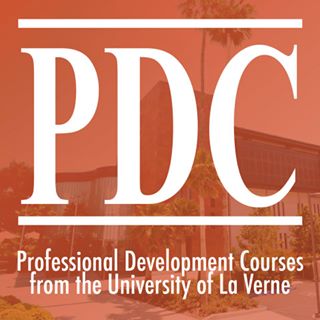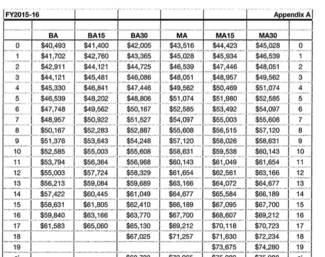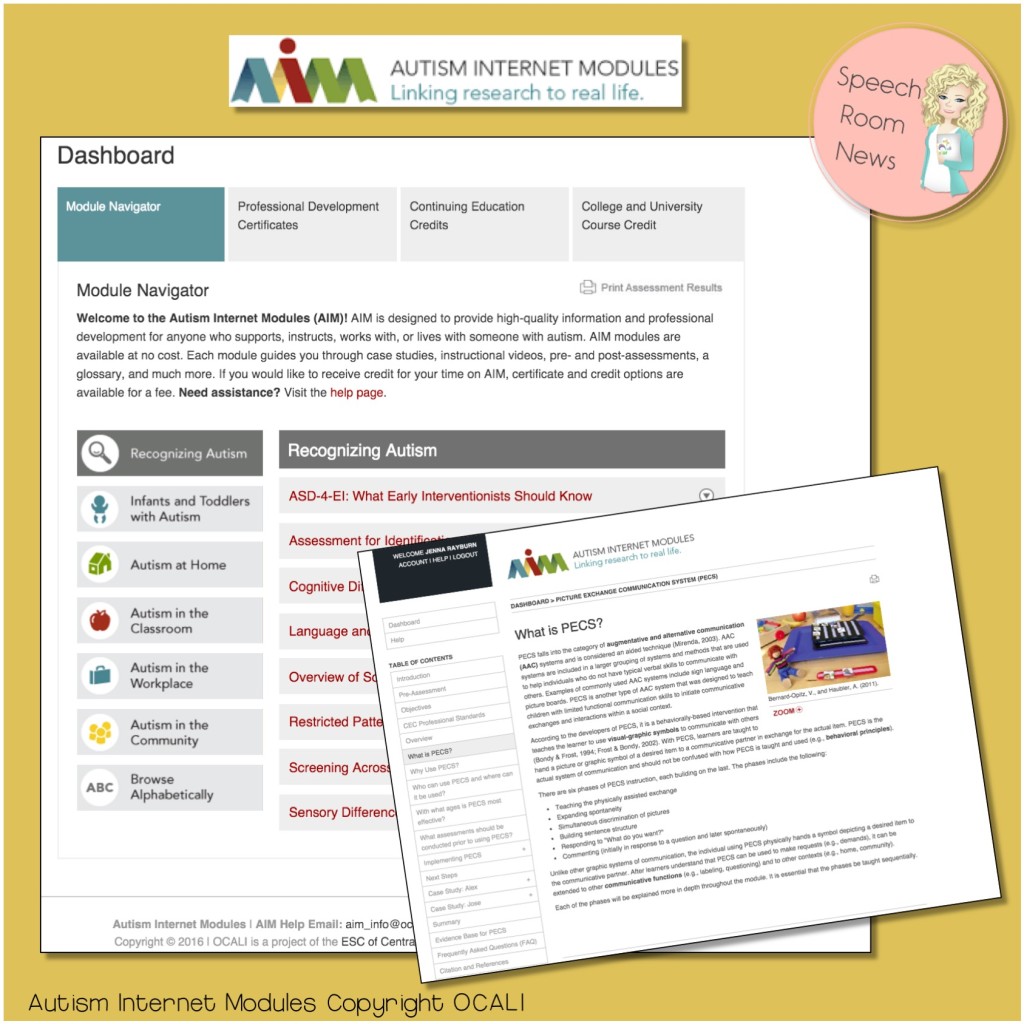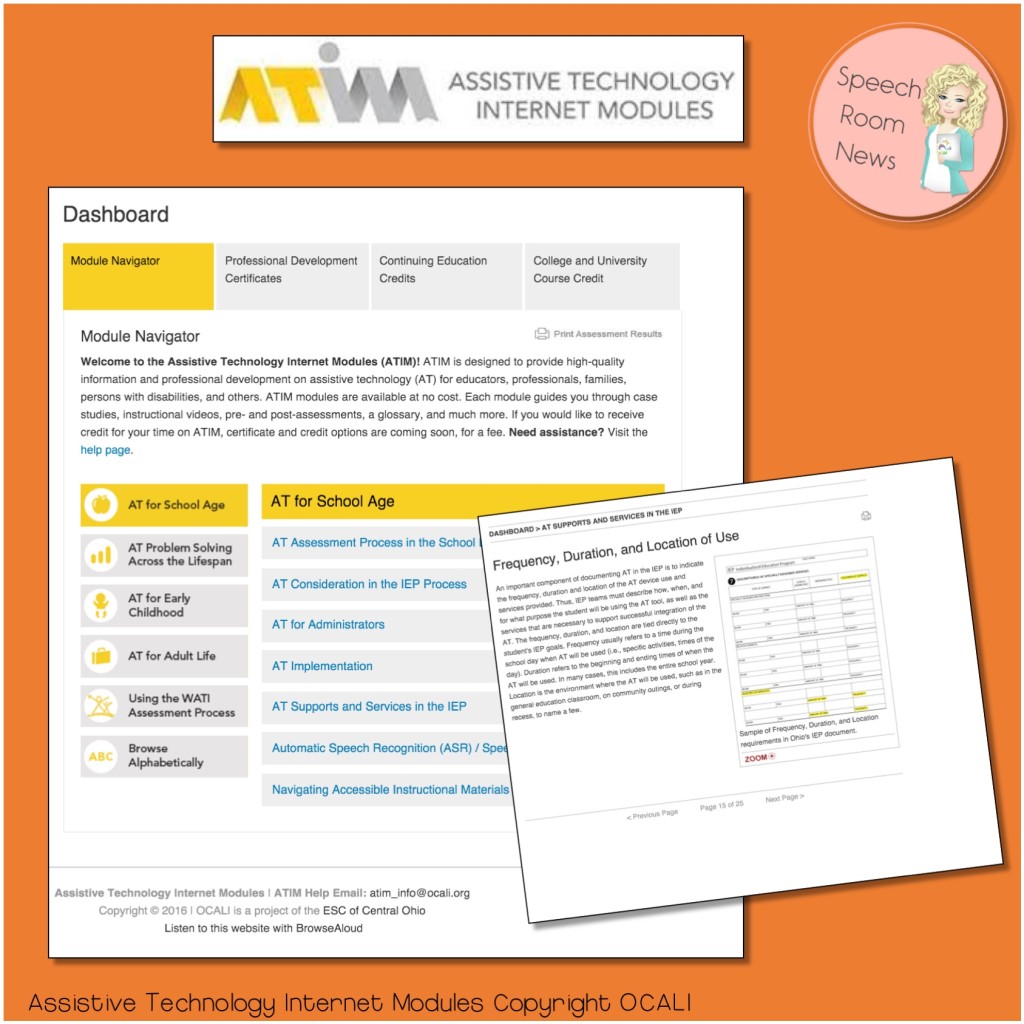
School-based Speech Language Pathologists often have a chance to move up their pay scale but aren’t jumping at the chance to spend more time and money to complete coursework. Especially if you just finished paying off your original student loans {like me!} School SLPs determine their income based on a school salary schedule. This means you can move up in pay in two ways. The salary schedule is simply a grid of rows and columns, with the rows down the side being increasing years of service, called “steps,” and the columns across the top being increasing education credentials–bachelor’s degree, master’s degree, and doctorate, with intermediate steps to recognize the accumulation of continuing education credits from professional development.
(This sample salary is the first one that appeared on a google search. It is not my pay scale and might not even be a schedule that SLPs in this district follow! It just popped up first.)
On the vertical axis, you earn an increase in pay based on your years of experience. On the horizontal axis, you earn a salary differential based on level of education. Today I wanted to share some information about increasing your level of education in a way that doesn’t break the bank …. or your spirit. Let’s face it – the idea of more classwork in your already busy life is tough.
A salary differential is an incremental increase in salary based on academic credit, coursework or degrees earned. The salary differentials are listed horizontally across the top of the salary schedule. An appointed teacher is eligible to move horizontally across the schedule as they accumulate academic credit, coursework, and degrees above the bachelor’s degree. Your district might call this “class change” or “salary schedule change”. Whatever they call it, it’s important to look at it and decide if it’s worth it to earn those extra hours. One of the things to consider is your retirement. Yes, earning an extra 14,000 per year at 18 years of experience (in the example above) is important but what is more important is your retirement! You will either be putting away a higher % each year (if you put a % into your retirement savings) OR your fixed retirement % will be based on that higher number over the last 3 years (if your retirement is a set amount and based on 3 highest incoming years).
So let’s say you’re ready to move up to Masters +15, +30 or +45. Where should you start? This year I’ve learned so much about the types of coursework out there and what it is going to cost you! Here are some opportunities I’ve liked and found along the way with information about how useful they are, how related to our field they are, and the cost. During this year, I will have earned 30 hours in one school year! It’s been exhausting but I’m working to get to +45 before our contract is renegotiated. I’m considering myself a semi-pro at this point! Each of these resources is one I have personally used or one that my friends have used. I hope you find the resource useful and don’t have to use the same number of hours searching as me!
Autism Internet Modules (www.autisminternetmodules.org)
AIM is designed to provide high-quality information and professional development for anyone who supports, instructs, works with, or lives with someone with autism. AIM modules are available at no cost. They are created by OCALI. Each module guides you through case studies, instructional videos, pre- and post-assessments, a glossary, and much more. If you would like to receive credit for your time on AIM, certificate and credit options are available for a fee.
This is an awesome free resource in general but since we’re trying to earn credits, sign up and take the course through Ashland University in Ohio. There are a total of 11 credit hours available at this time. I’ve taken 8 hours so far. For each course you complete a series of modules (about 10 modules per credit hour). They include a pre-test, reading/videos, and post-test. Once you complete all of the work you’re done! Start out trying out a module for free and see if you like it before purchasing the Ashland credit option. The cost per credit hour is $225. Ashland is really easy to work with and I’ve had no problems with the technical side!
Assistive Technology Internet Modules (atinternetmodules.org)
OCALI also offers one credit hour course through the Assistive Technology Internet Modules. ATIM is designed to provide high-quality information and professional development on assistive technology (AT) for educators, professionals, families, persons with disabilities, and others.
Each module guides you through case studies, instructional videos, pre- and post-assessments, a glossary, and much more. ATIM modules are available at no cost. The course through Ashland University is $225 per credit hour and also completely online.

University of La Verne has a separate PDC sight. I’m taking my last 15 hours through their online program. They send you books and then you complete the assignments on their website. I’m currently taking a class about dealing with difficult parents, ADHD and Aspergers! Three interesting ones for sure!
Learners Edge has over 85 Self-Paced, Continuing Education graduate level courses. A friend of mine who is a Kindergarten teacher completed 30 hours through Learners Edge and found it to be a cost-effective way to complete all her hours! I’ve browsed the catalog and found courses on counseling, ADHD, autism, and ELL students that sounds interesting.
Several teachers at my school have completed courses through VESi. VESi develops online education courses for professionals. Created by instructors at VESi, these courses are available for various types of credit including Continuing Education Units (CEU), Professional Learning Units (PLU), Professional Development Units (PDU), Clock Hours, Undergraduate credit, or Graduate credit. They work with over 90 universities. The prices change depending on your University, but for example using Ashland University in Ohio a 3 credit hour course was $400.
Assistive Technology Certificate
If you’re not new around the blog you might remember that this year I have been completing a 15 credit hour online certificate from Bowling Green State University. I’m almost done (12 credit hours done… 3 to go) with my Assistive Technology Certificate. The perks to a certificate program are mainly the skill building in a specific area and ability to add it to your resume as one complete package. BGSU credits cost $424 per credit hour (at almost double most other options I listed here.) You can read more about the AT Certificate on a blog post I wrote over the summer. This coursework is by far the most time consuming because it’s an actual set of classes with weekly assignments rather than work-at-your-own-pace websites like all the other classes recommended here.
If you’re looking for more information about salaries in your state, your state education association is one of the best ways to get information. Here is the link to the Ohio Education Association.
If you’re a member of your schools education association/union, check and see if they provide any tuition reimbursement. My district’s education association provides a certain amount of money each semester to be given to staff working toward class change. I’ve been able to get a small amount back each semester.
Keep in mind, the horizontal axis on the salary schedule is one item often tossed around in union negotiations and might not always be available to you. Start working on that first +15 soon!
Please comment below if you have used other websites or online opportunities for salary advancement. I can’t wait to hear what you’ve taken.
Join the SRN newsletter!

I'm so glad you stopped by! If you'd like to keep up with the newest posts and get exclusive free downloads, please sign up for the newsletter! Your first freebie is ready as soon as you subscribe and confirm your email!








Hi Jenna
PDI is another site for online classes that are SUPER affordable!!
pdicourses.com
Darbi
its actually webteaching.com
that takes you to their home page 🙂
Creativeteachered.org is really cheap and I took several classes for salary advancement. They have courses for all areas. They even have a speech path that offers courses. Very easy and cheap. $255 for 45 hours/3 credits.
Hello,
I have an undergraduate degree in Speech and Language and would like to work as a SLPA – degree is not in the last 5 years – So, state of Md requires 5 undergrad classes in SLP. Do you know if creativeteachered offers classes like normal lang. devel., lang disorders…etc
Unfortunately, the $255 is only for continuing ed, not graduate units. If your district requires graduate units on an transcript (like mine does) these courses are actually $500/ 3 units, which is significantly more expensive than many others. 🙁
I’ve taken 2 through the University of La Verne online. They are very affordable ($345 for a 3 credit course) and I learned a lot from the two course I took. These don’t have any specifically geared toward SLPs, but there are still a lot of good choices. Hope this is helpful to somebody!
https://www.pdcourses.net/
Sorry for my typos 😉
Hi Amy,
What is the format for University of La Verne courses? Writing assignments?
Thank you,
Catherine
Each one that I took had reading comprehension questions straight from the next for each chapter and also a writing assignment that paired with the course. The grading on these was really fast. Like a 2-3 days once I submitted online.
About how much time did you need to dedicate towards a 3 credit course through La Verne?
Hi Paula, It’s been a while and I can’t really remember. Several hours a week but it did not feel overwhelming. Most of the work was filling out guided notes as I read. Then a few projects or papers.
Another option is through Video Continuing Education, LLC (www.speechtherapypd.com) with Portland State University (PSU). You can take up to 10 hours per quarter (1 quarter hour = 10 video hours). You choose online streaming video courses you watch and apply what you learn to your job.
Cost: $189 for access to the streaming videos on http://www.speechtherapypd.com
$60 per credit to PSU. You could take up to 10 quarter hours for $789.00
For more information: http://www.speechtherapypd.com/ets/pages/?p=graduate_university_credit
I had just stumbled upon speechtherapypd.com (PSU) before reading this blog. Has anyone taken classes through there? Looks promising.
Do it! Its the best thing ever! (See my comment below)
Hi Darla, Do the classes involve just watching videos? Or is there reading or written assignments/tests also involved? Thanks!!
I highly recommend Video Continuing Education. I have taken all the available graduate credits for this and wish there were more! You watch videos of past conferences on topics relevant to our field, take tests at the end of the video, and briefly summarize how what you learned can be implemented your practice. Darla and her team is easy to work!
Hi Jess,
In response to your comment on 5/5/17 regarding Video Continuing Education – I just want to be sure that I am understanding this correctly: Is one credit hour equivalent to one graduate credit? In Darla’s post, she states that one can take up to 10 hours per quarter… I just want to be sure that this is equivalent to 10 graduate credits?
Hey Sarah- you should contact the company directly and find out how their hours/programming work. I wouldn’t rely on information passed on from others!
Are you allowed to use these classes towards CEU requirements for ASHA?
According to ASHA: “College or university course work at any level-undergraduate, graduate, or doctoral-offered by regionally accredited programs (can be via distance learning) in any area that meets the definition of professional development (i.e., foreign languages needed to communicate with the population you work with, early childhood development, autism, literacy, neurological disorders, genetics, ethics).” is counted toward renewal. http://www.asha.org/certification/FactDef/
I was wondering the same thing. I just received my license and CCCs a couple months ago (so I am new to this). Will the CEU hours be the same as your “credit hours”? So you said you earned 30 credit hours in a school year, does that mean you were also able to apply 30 hours of CEUs to ASHA and your state license?
Thanks!
So one semester hour = 15 CEU hours in Ohio. Therefore a 3 credit hour course would be 45 hours towards your CEUs.
Are you required to write a paper for the AT or autism modules?
Nope. Just Take the pre-test, click on each individual page in a module, and complete the post-test (it’s the same as the pretest). You do that for each module within a class.
Do you need to take it through a university, or directly through the company.
Through the AT modules, you have to enroll through ASHLAND university. The instructions are on their website.
Hello,
I notice on the AIM website that the courses have specific start and end dates. Is it possible to complete the course quicker than the 5-weeks/self-paced? Or must you follow the time line? I am hoping to gain 2 add’l credit hours my January when I have to submit all my course work for this semester (I will have 18 and my next step is 20!)
Thank you,
Catherine
For the Autism Internet Modules, you can finish them quicker for sure. I am not sure about the timing of getting your info verified on a transcript though. I think you might have to wait to get your transcript until the end date of the course.
Hi Jenna. I just took an online Chemistry course from Shasta college that was extremely fun. It was a three unit course and was $165.00. I rented the book from Amazon for around $30. I just wanted to throw that out there. I took it during summer and the course was affordable and very interesting. I am a speech path as well.
Curious why you took a chem course?
I have taken courses through Theracourse. They are designed specifically for SLPs and are only $350 for 3 credit hours. They’re online and self-paced. It gives you graduate credits through a university in Colorado. I also completed an AT Specialist program at California State University Dominguez Hills. It cost $795 for a 3 graduate credit course. Each course runs 11 weeks and is all online. There are 5 classes to complete the program.
How was the grading of the theracourse classes?
Hi, I was interested in hearing more reviews on Theracourse! Thanks.
I know this is a very old comment, but just in case in benefits anyone, I thought I would recommend TheraCourse, too. I have taken three courses, and it is a breath of fresh air to be offered speech-specific courses toward salary advancement. Courses are affordable, the content is self-paced, Valerie the founder is extremely reachable, and the grading is fair.
My state of Vermont is requiring that I take a course on the following:
The relationship of language and literacy and role of school based SLP:
Teaching strategies and accommodations which support the learning of individuals with communication delays and disorders, including instructional methodologies and augmentative or alternative communication systems that support language development and/or communication in all modalities ”
I sent them all my Grad courses which have this embedded but they didn’t accept. Any suggestions for online courses anyone has taken?? I have to take a 3 credit course by June of this year. I am a school based CCC-SLP.
I should probably just search the sites above, but thought I’d ask as well.
Hope you all have a great day!
How long are the autism internet modules and/or how many hours do you get for the 4 free ones?
You don’t get Semester credit unless you register for them through Ashland.
I am not sure what you mean by semester credit. I was looking to possibly take the 4 freebies for professional development to move up my districts salary grid and just receive a certificate for proof of taking the course.
I’m in my last year of graduate school and looking for positions. This is timely as I was trying to make sense of the columns. Are these units anything after your BA? For instance, I am completing a 3-year program because I went back to school after working in another field. Do these “undergraduate classes” I took in my first year of my program count?
It depends. If the classes counted towards earning your BA they count as that. If they were hours used to earn your master’s they count towards that. After you earn the MA, additional hours earned start counting as Masters+15, etc.
I’ve completed 15 credit hours through Learner’s Edge. I would highly recommend the courses entitled: In the Face of Poverty and Neurodiversity. I learned a lot from them. I have also taken the course on Autism. It would be great for someone in general education that is going to be working with the students with autism that are mainstreamed. I work in a special education setting and so much of the course was a review.
What was the format for the course? Read, then take a quiz, Reading followed by writing assignment? I am in the middle of one right now that has an obscene amount of writing, and I am not interested in repeating my mistake. So, any feedback would be appreciated. Thanks!
Which course were you in that had a lot of writing?
Something I learned a couple of years ago is that some school districts will allow you to progress up/across the salary scale by accumulating PDPs, but others require graduate credit. A colleague had taken many courses over the years but never bothered paying for the graduate credit because her district didn’t require it. When she moved to my district she was surprised to find that all those PDPs counted for nothing in terms of the payscale 🙁
Hi I have a,question…I need to present 30 credits for speech salary advancement. I’m planning on enrolling into DOE as I am self employed at the moment. I recently went to ASHA convention and earned 30 CEUs. Does anyone know if those credits can be applied toward the 30 credits requirement. Thanks
I was wondering the exact same thing, however I think the comment above about PDPs counting in some districts to move across, but graduate coursework is required in others is the answer. I can’t find anywhere that a University sponsors he ASHA convention for graduate credit. It kinda seems like a money grab on the part of the Universities.
Hello. Were you taking more than one course/module at a time with Autism Internet Module? I know you completed 8 of the 8 of the modules at the time you wrote this. I see 8 courses listed on the early summer schedule and am trying to get an idea of how many at once would be manageable!
Thank you!
I did 6 at a time. I think you could handle 8 if you’re not working!!!
For AIM and ATIM what course modules do you recommend?
Jenna, what do you think about the difficulty of your courses with University of LaVerne? I am considering taking some over the summer but wondered how much time and effort is required
Certainly easier than a graduate speech therapy course. Just time consuming for the reading. It was mostly read and answer questions work with a few longer essays for each course.
Definitely look at Dominican University of California. They have a fantastic class called “Maximize Student Success Through Enanced Instructional Design” (EDUX 9940). It allows each student to tailor their work to their job.. http://dominicancaonline.com/edux-summer-course/. You can choose 2,3,4 or 6 credits. Each credit requires 25 hours of work. I know that this sounds like a lot but you get to pick how you want to use those hours. Last summer I researched working with students with Down Syndrome. I read books and journal articles. Then I modified some of the curricular books that my students with Down Syndrome (or language disorder) will be reading in the upcoming school. I searched TPT for resources, printed, laminated, etc. ALLof that time counted toward my total hours. This is truly the best class around. We finally get credit for all of the material adapting that we do on our own time. Plus, you can’t beat the price at $135.00 per credit hour. This summer I plan to catalogue all my materials, then list resources based on topic all in one binder, This will save me so much time during the school when I am planning lessons as I will have a breakdown of all my materials listed in one binder. No more searching through individual books looking for a particular lesson.
Can someone comment on how much work was required when completing a theracourse?
Thanks
Hi Jenna! Did you ever look into getting a second Master’s? My new district offers MA+15 and then another jump for multiple advanced degrees. Just curious if you had any prior knowledge on this, or if anyone has any thoughts on an affordable and relevant 2nd Masters!
My district doesn’t include a pay-raise with the second masters – it’s just based on hours. I don’t have any interest in administration so it wouldn’t be worth it to me!
I’ve been looking at taking additional credits. Even considered possibly doing an online SLP-D or AuD program. However, just found out my new district only reimburses for three credits per year. 🙁 For those of you who did do the AT certificates, are you able to spread out the five classes over a prolonged period of time, or do you have to complete it within a certain period of time. I assume the modules can be taken one at a time, over time, as long as you are paying the fee. I appreciate the feedback. Thank you!
Can anyone comment on their experience with Theracourse? How difficult was the work required?
I was hoping for the same information. It has been asked several times, but no answers as of yet. I check back every month or so hoping to get more info. I am also curious about the format of the courses. Read and write essays? Watch videos and take tests? Anyone? Anyone? Bueller? Bueller?
Sorry, I haven’t used that resource.
I just finished a 1 credit course with Dominican University of California called Reflective Reading. You select a book from a list, read it, answer several questions (maybe 5 short answer) post at least 2-3 comments on the chat groups and write one 3 page paper. It was very worthwhile. You can sign up more than one time by reading another book.
So, I took the chance and registered for a course on stuttering through Theracourse.com. I am very happy that I did. The required book is an excellent resource. The activities are reasonable and varied. Prior to reading the book you write a self-reflection essay. Then you read the text book and take several quizzes based on the reading. There is a required video to watch at stutteringhelp.org with a short assignment following, a role-play activity in the community (pseudostuttering) with a reflection paper based on this activity, some additional short answer questions and a final paper. I haven’t received my grade yet but, overall, this has been a really great class. I’ve definitely learned some new things and increased my confidence in this area and even though this is my final class to reach my required credits I plan on taking the course they have on working with students with Down Syndrome since the book that goes along with this class is in the same series of learning books as the stuttering course.
Jenna,
How did you come across the information about an AT certificate? Are other certificates related to our field available? I Love your blog, thanks for all of your advice, ideas, materials and time!!
I just started googling it! I know there are several Autism ones.
Thanks, I have found several!
Thanks, Christine, for your response about TheraCourse. Most of the online graduate courses that I’ve seen offer a syllabus and very specific information about requirements (tests, papers, etc); in contrast, TheraCourse’s information is very sketchy. Were you able to access that information before registering for the class?
I used TheraCourse for a 15 credit advancement. The courses were typically comprised of multiple choice short responses to vidoes/articles and then a final paper. The longest minimum I had was 3 pages. She grades them pretty quickly. I did have some issues with CSU Pueblo who provide the credits but they were tech issues that were resolved once they were alerted.
Regarding Theracourse, is the test open book or are you able to retake the test if you don’t pass?
Sorry if this is a dumb question but how do you know if classes can be counted Toward the pay scale advancement or not? Are there certain fields Of study it must be related to etc? Thanks!
You need to ask your school, but for most it doesn’t matter the field. You just need the credits.
Has anyone taken any courses through SpeechTherapyPD.com?
I am doing them right now and am pretty happy with it. You watch a certain number of hours of videos 15/ credit hour, take tests at the end of the videos, and write a paper for each class. It is super affordable and the SLP that grades everything has been pretty quick to respond. It is just time consuming trying to get the videos in. I’ve done 5 of the classes so far.
That sounds great! How does one sign up for that?
I highly recommend SpeechPathologyPD. You pay a $189 yearly subscription fee and then $62 per credit hour. Credits are offered though the University of the Pacific. 15 CEU hours= 1 credit. Super easy and affordable